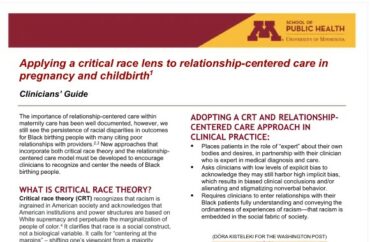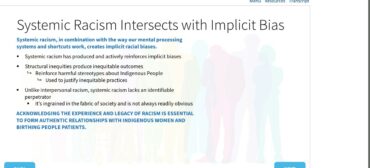
UPDATED
Course applies ‘a critical race lens to relationship-centered care in pregnancy and childbirth’
The University of Minnesota School of Public Health helped sponsor an online perinatal course on critical race theory and implicit bias, co-developed by an “antiracism” research center director and Planned Parenthood board member.
The continuing education course for health professionals, “Dignity in Pregnancy & Childbirth: Preventing Racial Bias in Perinatal Care,” focuses on “Black birthing people,” according to its website.
According to a university news release, the course is co-sponsored by the nonprofit Diversity Science with aid from the Minnesota Department of Health, the University of Minnesota, and the U. Minn. Center for Antiracism Research and Health Equity.
Public Information Officer Scott Smith at the Minnesota Department of Health told The College Fix in an email a “key goal of the curriculum is for health care healthcare professionals to deepen their understanding of the impact of structural racism on the health and healthcare of Black and Indigenous women and birthing people. “
In 2021, Minnesota passed the Dignity in Pregnancy and Childbirth Act, requiring hospitals and birthing centers to offer a “continuing education course on anti-racism training and implicit bias” to its employees and contractors.
The Fix asked course co-developer Rachel Hardeman via email twice over the past two weeks whether all inequities in health care are due to racism and, if so, how healthcare professionals address other causes. It has not received a response.
 In March 2021, the University of Minnesota appointed Hardeman (pictured) as leader of its Center for Antiracism Research for Health Equity, The Fix reported at the time.
In March 2021, the University of Minnesota appointed Hardeman (pictured) as leader of its Center for Antiracism Research for Health Equity, The Fix reported at the time.
She is a “reproductive health equity researcher” who studies racism inequity in health care, according to the Minnesota Population Center. She serves on the Board of Directors for Planned Parenthood of the North Central States.
Her “overarching goal is to contribute to a body of knowledge that links structural racism to health in a tangible way, identifies opportunities for intervention, and dismantles the systems, structures, and institutions that allow inequities to persist,” according to the Population Center.
The Big Ten university did not respond to a media inquiry about what role it played in designing and funding the course. The Minnesota Department of Health did not respond to a question about similar training resources for non-black women.
The course teaches how doctors and midwives must “make a commitment to learn and practice how [they] can interrupt racial bias” and “use evidence-based strategies to interrupt [it],” according to its website. Anyone can register for and take the course, which offers a completion certificate and an optional one hour of continuing education credit for medical professionals.
Its focus is on how white health providers can “misunderstand” black patients due to unconscious bias and stereotypes, according to course materials.
The first slide of the course begins with a “Letter to Learners who Identify as Black, Latino/Latina, Indigenous, People of Color, or as a Member of any Marginalized Group.” It provides a compilation of “resources that we hope will be helpful for naming, coping with, and transforming racial trauma.”
Doctors and midwives must “make a commitment to learn and practice how [they] can interrupt racial bias” and “use evidence-based strategies to interrupt racial bias,” according to the training.
An attached course handout on “Reproductive Justice” describes how the black women’s group “Women of African Descent for Reproductive Justice” created the concept in 1994.
Another handout (pictured below) purports to educate in “applying a critical race lens to relationship-centered care in pregnancy and childbirth.”
It also states “inequities in birth outcomes experienced by Black individuals are driven by historical and structural injustice that can only be remedied through relationships that shift power, that is, through the application of a critical race lens.”
 .
.
The course identifies “systemic racism” as the root of the problem. One slide (pictured below) reads, “systemic racism, in combination with the way our mental processing systems and shortcuts work, creates implicit racial biases. Structural inequities produce inequitable outcomes which reinforce harmful stereotypes about Indigenous People.”
The course description states that “in the US, Black and Indigenous people are twice as likely to experience a preterm birth (PTB), give birth to a low birth weight (LBW) infant, or experience the death of an infant before age 1 compared to white women.”
“Similarly, Black and Indigenous women in the US are more likely to die during or in the year following childbirth,” it stated.

Providers taking the course will learn how to “protect or buffer their patients from the impact of structural racism in health care delivery,” according to the description.
Hardeman, in a 2021 study on “racist police practices,” noted an association between policing and preterm births.
However, she did not identify a single pregnant woman who had an adverse pregnancy outcome after coming into contact with a cop, The Fix reported at the time.
Hardeman acknowledged as much in the study, saying, “[W]e did not (and would not have been able to) ascertain whether the pregnant people in our study had personal contact with the police before or during pregnancy.”
Editor’s note: The article has been updated to clarify the class is recognized through the Accreditation Council for Continuing Medical Education.
MORE: ‘Anti-racism’ required for medical professionals, U. of Minnesota teaches
IMAGES: University of Minnesota School of Public Health,
Like The College Fix on Facebook / Follow us on Twitter






Please join the conversation about our stories on Facebook, Twitter, Instagram, Reddit, MeWe, Rumble, Gab, Minds and Gettr.